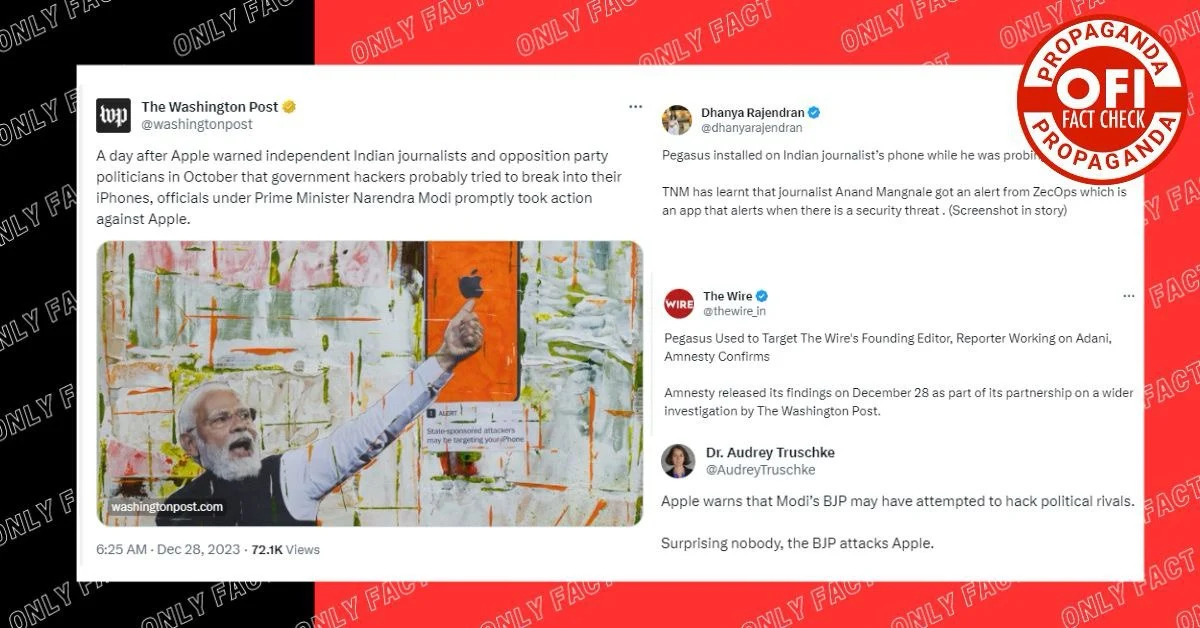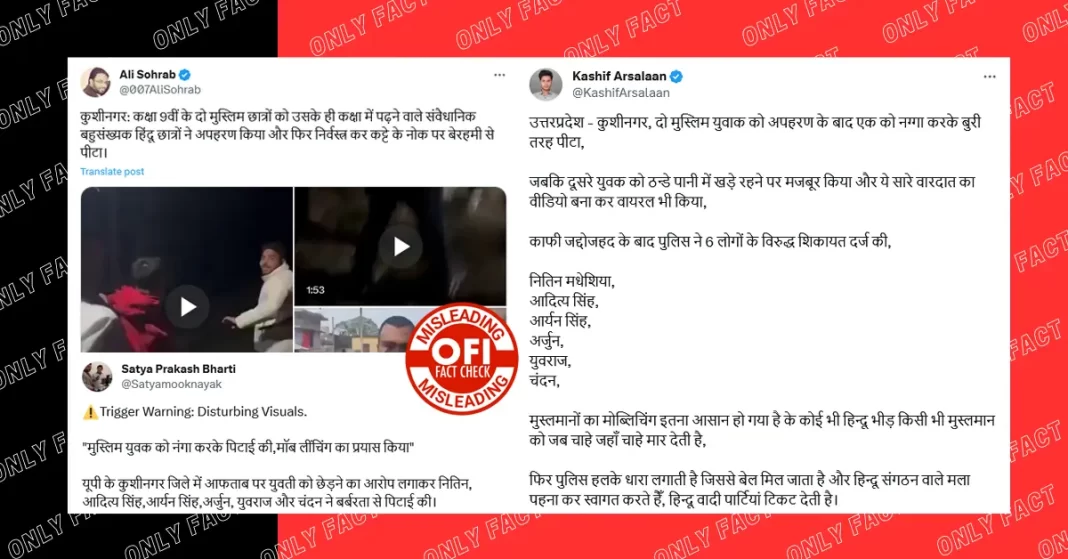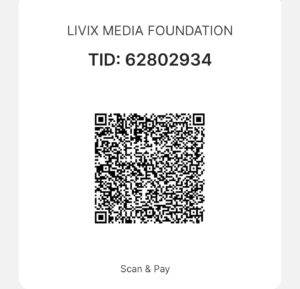In an era where numerous technology think tanks unequivocally forecast India’s ascent to the pinnacle of technological prowess, notable instances such as Apple’s strategic decision to manufacture devices in the country and Google’s colossal headquarters undertaking in Hyderabad serve as compelling testaments to this trajectory. However, the journey to becoming a technological superpower is fraught with challenges, replete with formidable hurdles that demand careful navigation. The exhaustive article by The Washington Post stands as a poignant illustration.
A day after Apple warned independent Indian journalists and opposition party politicians in October that government hackers probably tried to break into their iPhones, officials under Prime Minister Narendra Modi promptly took action against Apple. https://t.co/uKp0BBcxLl
— The Washington Post (@washingtonpost) December 28, 2023
In a recent and exhaustive article, the American Daily alleges that the Indian government has been implicated in the deliberate targeting of Apple companies, ostensibly for their involvement in transmitting illicit hacking messages during the month of October 2023.

On December 27, The Washington Post disseminated an extensive exposé, leveling accusations against the Indian government for purportedly targeting both Apple and its employees. The publication further asserted that the Modi administration allegedly pressured Apple to “soften the political impact of the warnings.” Later on the article, lacking substantive evidence, shifted its focus towards implicating the Adani Group.
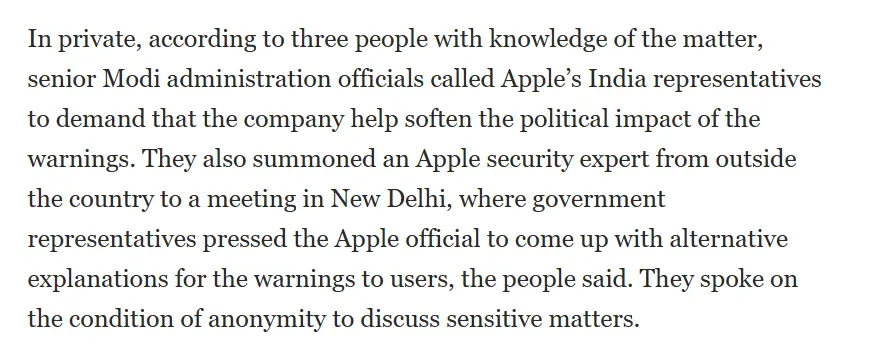
According to The Washington Post’s narrative, in August 2023, when journalists from OCCRP sought answers from the Adani Group, the subsequent day witnessed their phones becoming the focal point of Pegasus surveillance. In an attempt to fortify their narrative, the article went on to recount the experience of Gurupatwant Singh Pannun, identified as a Khalistani terrorist, who claimed that his phone, too, had been subjected to targeting by the Indian government.
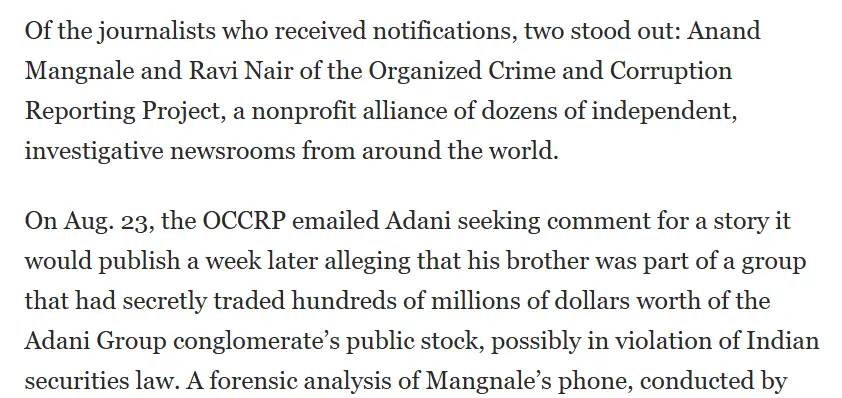
As is customary, The Washington Post’s piece found resonance among various leftist factions in India, gaining widespread traction through publications such as The Wire, and The NewsMinute. Nevertheless, within the confines of this article, we will unveil the propagandistic underpinnings inherent in The Washington Post’s narrative. Our exploration seeks to delineate how this particular article serves not as a neutral report but rather as a pointed assault on India.
Pegasus Used to Target The Wire's Founding Editor, Reporter Working on Adani, Amnesty Confirms
— The Wire (@thewire_in) December 28, 2023
Amnesty released its findings on December 28 as part of its partnership on a wider investigation by The Washington Post.#Rightshttps://t.co/WyXOAigGzV
Pegasus installed on Indian journalist’s phone while he was probing Adani issue.
— Dhanya Rajendran (@dhanyarajendran) December 29, 2023
TNM has learnt that journalist Anand Mangnale got an alert from ZecOps which is an app that alerts when there is a security threat . (Screenshot in story)
https://t.co/eI7aRz9JKo
https://twitter.com/audreytruschke/status/1740509520273842541?s=46
Also Read: The Washington Post Article Debunked: Crackdown on Shady NGOs has nothing to Do with Adani
Fact Check
1- Union Minister of State for Electronics and Technology, Rajeev Chandrasekhar Rebuttal
In any story fraught with nebulous allegations lacking certainty, a pivotal journalistic tenet is imperative to present perspectives from both sides of the aisle. Regrettably, The Washington Post fell short in adhering to this principle. In stark contrast, Union Minister of State for Electronics and Technology, Rajeev Chandrasekhar, known for his forthrightness, did not refrain from delivering a robust response. In response to The Washington Post’s article, Chandrasekhar articulated a compelling rebuttal on platform X.
Rajeev Chandrasekhar wrote, “ Rebutting Washington Post’s terrible storytelling is tiresome, but someone has to do it.
1-This story is half facts, fully embellished.
2-Left out of the story is Apples response on Oct 31- day of threat notifications
“Apple does not attribute the threat notifications to any specific state-sponsored attacker.
State-sponsored attackers are very well-funded and sophisticated, and their attacks evolve over time. Detecting such attacks relies on threat intelligence signals that are often imperfect and incomplete. It’s possible that some Apple threat notifications may be false alarms, or that some attacks are not detected. We are unable to provide information about what causes us to issue threat notifications, as that may help state-sponsored attackers adapt their behaviour to evade detection in the future”
Ministry of Electronics & IT and my response to this incident has been consistent and clear from the incident – That it is for Apple to explain if their devices are vulnerable and what triggered these notifications.
Apple was asked to join the enquiry wth Indian CERT and meetings have been held and enquiry is ongoing.”
Rebutting @washingtonpost 's terrible story telling is tiresome, but someone has to do it.
— Rajeev Chandrasekhar 🇮🇳 (@RajeevRC_X) December 28, 2023
➡️This story is half facts, fully embellished 😅
➡️Left out of the story is Apples response on Oct 31- day of threat notifications
“Apple does not attribute the threat notifications to… https://t.co/6XhRC8QVBu
2- The Indian Government Didn’t pressure Apple to soften their warnings
Moving on to the next part, on October 31, when Apple’s notification regarding a “state-sponsored” hacking incident surfaced among Indian political leaders, the immediate response from the Indian media was to scrutinize the definition of a state-sponsored attack as articulated by Apple. Notably, the alignment between Apple’s stance, as elucidated by Rajeev Chandrasekhar. It is imperative to note that Apple had already disseminated this information on August 22, 2023, well in advance of the aforementioned hacking notifications on October 31.

Crucially, since August 22 there has been no alteration in Apple’s position on state-sponsored attacks. Consequently, the contention that the Indian government coerced Apple to “soften the political impact of the warnings” stands unsubstantiated.
3- State-sponsored attack doesn’t mean a hacking attack by the Indian Government
Following the hacking threat notifications, an Apple spokesperson emphatically refuted the notion that a “state-sponsored” attack specifically implicates the government of any particular nation. The Apple definition of a state-sponsored attack, as expressed in their statement, underscores the ambiguity inherent in the term, encompassing a spectrum of highly sophisticated attacks. Apple’s official statement expressly asserts, “Apple does not attribute the threat notifications to any specific state-sponsored attacker.”

Moreover, the statement underscores the inherent complexity of state-sponsored attackers, characterizing them as well-funded and sophisticated entities whose tactics evolve over time. Therefore, the allegations put forth by The Washington Post, labeling the state-sponsored attack as an assault orchestrated by the Indian government, are false. The publication, in a seemingly mischievous manner, selectively adhered to the generic interpretation of a state-sponsored attack to potentially mislead its readership.

4- The Indian Government and Apple are doing joint investigations, no place for strong-arming
As of December 2023, Apple commands a market capitalization exceeding 3 trillion dollars. The implication in The Washington Post’s allegations is that the Indian government, purportedly leveraging its influence, is pressuring a corporate behemoth of Apple’s stature, particularly on matters concerning security—a core tenet of the tech giant. Contrary to such insinuations, as reported by Live Mint, Indian IT Minister Ashwani Vaishnav issued a notice to Apple a day after the cyber attack, urging the company to collaborate with CERT, the Indian Computer Emergency Response Team, in their ongoing investigation. The IT secretary affirmed, “CERT-In has initiated its probe, and Apple will actively participate in the investigation.”

Furthermore, as highlighted by ABP News on November 24, Apple has signaled its commitment to the investigation by dispatching a team of experts to India to contribute to the ongoing probe into the hacking threat notifications. Therefore, the assertions of the Indian government purportedly targeting, harassing, or intimidating Apple and its personnel stand contradicted by the collaborative efforts underway between Apple and Indian authorities in jointly investigating the cyber threat.
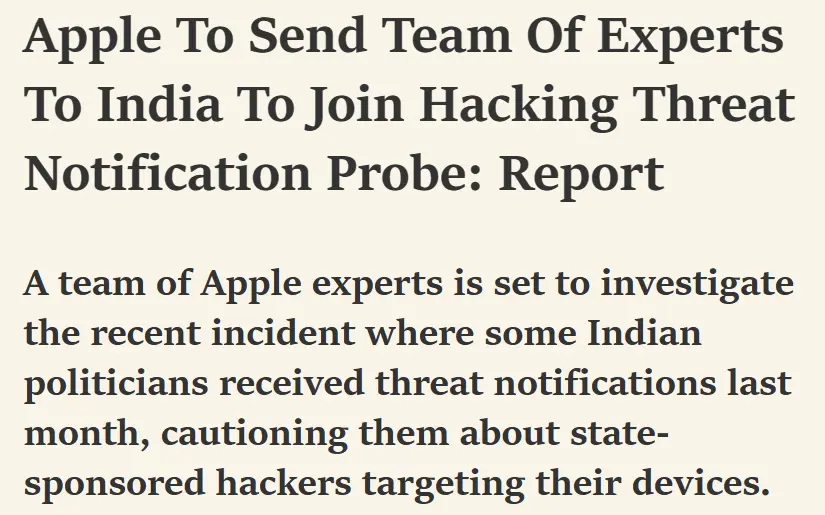
5- Yet another attempt of George Soros funded group to connect the unlinked controversy to the Adani
Later on, The Washington Post incorporated Indian business magnate Gautam Adani and the Adani Group into its narrative. The article alleged that one of the authors behind the August 31 OCCRP piece on Adani fell victim to Pegasus, an NSO spyware. Notably, the post contended that Anand Mangnale, rather than Ravi Nair, was the targeted individual.
Only Fact readers are acquainted with the nuanced landscape of anti-India narratives, particularly involving Ravi Nair. The selective targeting of Mangnale’s phone, while overlooking Nair, raises questions, especially given Nair’s reputation as a vocal critic of the Adani Group.
Crucially, Amnesty International, the organization that identified Mangnale’s phone as a Pegasus target after he sought responses from the Adani Group, introduces a noteworthy aspect. It is imperative to acknowledge a well-known fact: both OCCRP and Amnesty International operate under the aegis of the same influential group led by George Soros. This shared affiliation underscores the lack of a third-party independent and unbiased entity to verify the hacking claims. The accuser, Mangnale, and the arbiter, Amnesty International, belong to the same organizational nexus, leaving scant room for a truly impartial investigation.

Conclusion
The Washington Post’s narrative is rife with fabrications and deception, constituting a desperate attempt to assail India and its Prime Minister, Narendra Modi. Contrary to the publication’s insinuations, Apple and India are actively collaborating to address security concerns. Since the tech giant shifted its operations from China to India, a series of contrived efforts by Indian leftists have sought to sow discord between the government and the company. Earlier episodes, such as the Luxshare controversy, bear witness to this trend, and the current allegations follow suit. Nevertheless, these attacks merely underscore Apple’s unwavering commitment to its partnership with India. Recent reports indicate that Apple has set ambitious goals, aiming to manufacture one lakh crore iPhones in India, further exemplifying the depth of the company’s dedication to the Indian market.
| Claim | Indian Government targeted tech giant apple and its employees |
| Claimed by | The Washington Post |
| Fact Check | Misleading and Propaganda |
Also Read: Decoding the FT Web 2.0: Unmasking Another Coordinated Toolkit by Left Cabal on October 12, 2023

